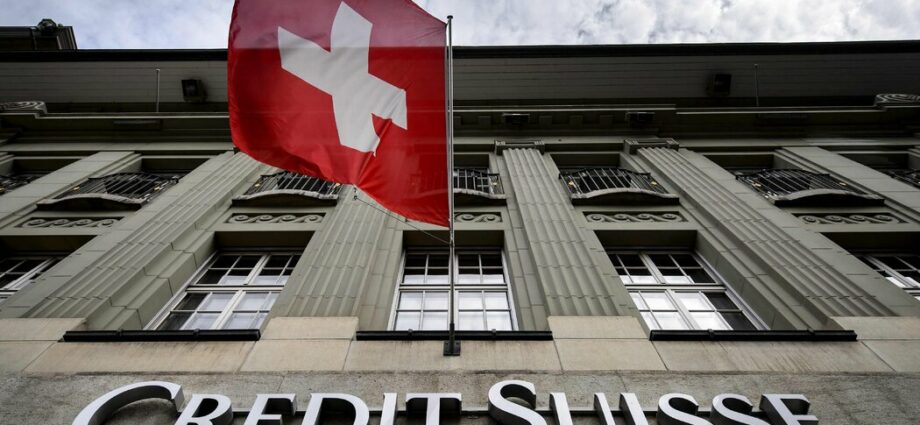Stock markets tumbled on Wednesday, as investors’ fears over the health of the banking industry resurfaced and spread around the world, undoing a rally on Tuesday when the panic appeared to pause.
European markets were hard hit, with stocks of many of the region’s biggest banks falling sharply. Premarket trading in the United States also suggested that much of Tuesday’s gain could be swiftly erased, as anxiety persists about the fallout from the collapse of Silicon Valley Bank and Signature Bank, which were seized by regulators after suffering devastating runs on deposits.
The catalyst in Europe appeared to be Credit Suisse, the mistake-prone Swiss bank that has struggled for years to turn around its fortunes, with customers steadily shifting their assets to rival banks. It recorded the most eye-catching decline, with its shares losing more than 20 percent, setting yet another record low. On Wednesday, the bank’s largest shareholder, Saudi National Bank, ruled out providing more money for Credit Suisse as it struggles with its latest turnaround plan.
The banks’ bond prices plummeted and the cost of insuring the bank’s debt against a possible default soared. S&P Global Ratings said on Tuesday that European banks had little exposure to Silicon Valley Bank or Signature Bank, nor did they view any European banks as being exposed to the same risks. “That said, we are mindful that SVB’s failure has shaken confidence,” analysts at the rating agency said.
The plunge in Credit Suisse’s shares set off temporary halts in its trading. Shares of two French banks, Société Générale and BNP Paribas, fell about 10 percent, Deutsche Bank in Germany lost 8 percent and Barclays in Britain shed 7 percent. The broad-based Stoxx 600 index fell by 2.4 percent, dragged down by the banks.
Our Coverage of the Investment World
The decline of the stock and bond markets this year has been painful, and it remains difficult to predict what is in store for the future.
On Wall Street, futures for the S&P 500 were about 2 percent lower, which implied that at the open of trading all of the previous day’s gains would be reversed. Shares of U.S. banks were mixed in premarket trading.
Nervousness was also apparent in the bond markets, with yields on government notes falling on expectations that the Federal Reserve could become more cautious about raising interest rates. Stubborn inflation would usually call for higher rates, but turmoil in the banking system could require more caution. Higher interest rates raise costs for companies and were at the root of the pain felt by banks over the past week.
A new reading of wholesale prices in the United States released on Wednesday showed that producer price inflation in February was not as rapid as anticipated, while fresh data on retail sales revealed a decline last month that was largely in line with expectations.
The Fed is scheduled to meet next week to set rates. The European Central Bank, which has also been raising interest rates to combat inflation, will meet on Thursday.
“Fed is nuts if they think they can tighten,” said Andrew Brenner, the head of international fixed income at National Alliance Securities. “They will break the bank system if they keep thinking like this.”
The yield on the two-year Treasury bond, which is particularly sensitive to Fed policy, fell by a fifth of a percentage point, a big move for that asset, to just over 4 percent. Futures markets still expect that Fed policymakers will raise rates by a quarter-point at their next meeting, but they now believe that the central bank will begin cutting rates in the second half of the year, setting rates at a lower level at the end of the year than they are now.
In a sign of the whipsaw trading conditions confronting traders, a measure of volatility in the bond market soared to its highest level since 2009.
“The U.S. banking system remains resilient and on a solid foundation, with strong capital and liquidity throughout the system,” Michelle Bowman, a Federal Reserve governor, said at a conference in Hawaii on Tuesday. She added that the Fed’s board of governors “continues to carefully monitor developments in financial markets and across the financial system.”
In a further sign of the global spillover of concern about the banking system, Vietnam’s central bank slashed interest rates overnight as it looks to support its economy.
And in debt markets, where banks and other investors facilitate loans to companies across the world, investors’ fears were reflected in sliding bond and loan prices on Wednesday morning. The moves amplified concerns about the potential knock-on effect from stress in the banking sector, and among some start-up tech companies, leading to some companies being unable to repay their debts.
“Systemic risks are not our base case, but fragility is back,” noted analysts at Bank of America.
Source: Read Full Article
-
European Shares Slip Into Red On Rate Hike Worries
-
Build-A-Bear Sets Nationwide Theatrical Release For Starry Holiday Pic ‘Glisten And The Merry Mission’ Under New Deal With Cinemark
-
HDFC Bank: Despite merger, stock may remain sideways, caution analysts
-
Twitter Faces Eviction From Boulder Office Due To Unpaid Rent
-
Most inappropriate workplace attire – from gym gear to flip-flops

